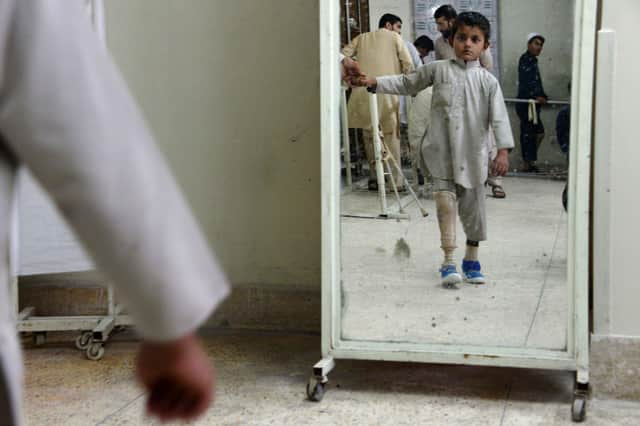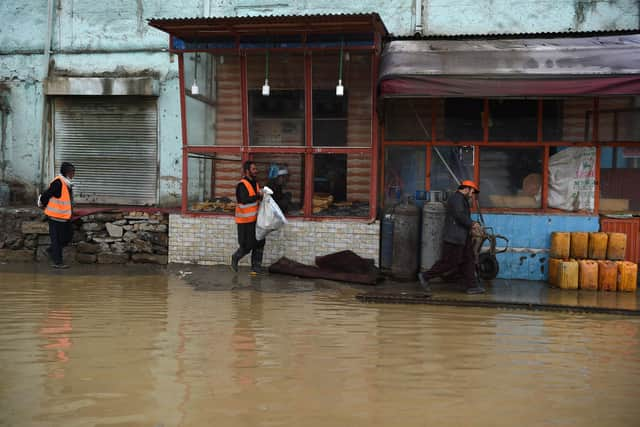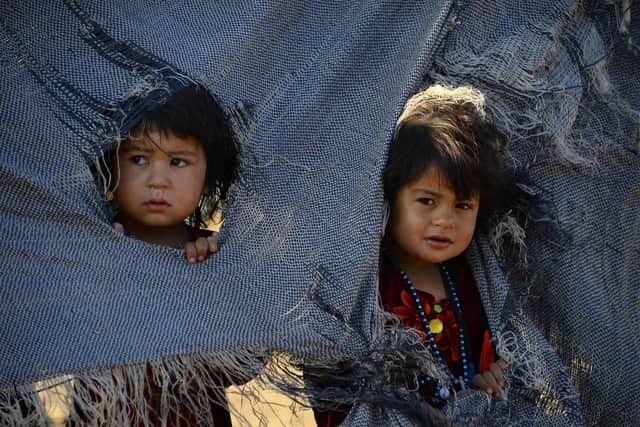Afghanistan crisis: 18 million need immediate humanitarian aid in a country ravaged by war and extreme weather – Maryann Horne, Red Cross


Afghanistan is in crisis. The humanitarian needs are huge. The Afghan people – men, women, and children – are looking to the international community for help but also hope.
This sentiment is one that I have encountered so many times in Afghanistan over the three years I worked there. Whether in makeshift settlements or resettlement villages built on cleared minefields, our experience at the Red Cross and Red Crescent Movement, working with international partners, helps us understand the complexities of what is needed.
Advertisement
Hide AdAdvertisement
Hide AdCrisis is nothing new to Afghanistan. Its people have been at the crossroads of conflict for centuries. Today’s generation has suffered from the legacy of war, severe food shortages and hunger – compounded by extreme drought and extreme weather changes. The dry ground has led to flash flooding this year, destroying livelihoods and forcing yet more people to leave their homes – amid the ever-present threat of Covid-19.
Now, weeks of heavy fighting has left thousands injured, and damaged or destroyed hospitals and critical infrastructure like water and electricity systems. More than 18 million need humanitarian support immediately, with around one-third of Afghanistan’s 38 million population going hungry.
What lies ahead is anyone’s guess. Uncertainty is nothing new, but the overlapping vulnerabilities create problems that even the most prepared will struggle with.
In this fast-evolving situation, crisis is what the Red Cross and Red Crescent Movement do best. The Red Cross family is in the country, monitoring humanitarian needs and working at the heart of communities to understand, prepare, deliver.


Working independently and in a spirit of neutrality, our movement reaches those others cannot. As a local agency, Red Crescent staff and volunteers are working in every single province, from north to south and right across rural Afghanistan. They are delivering relief operations, protection and health services that include 150 health centres and clinics, of which 36 are mobile health teams.
The Covid-19 hospital run in Kabul by the Afghan Red Crescent has also treated thousands of patients and remains operational as virus cases spiral. Our teams are distributing essential items, like food, water and cash to families.
I’ve worked in many countries, from South Sudan to Libya, Kosovo and on Syria and Yemen. But Afghanistan remains the starkest reminder of how diverse needs can be.
From droughts in the south to the need for resettlement in the lush north, there is no one size that fits all. People are chronically poor and live day by day, waiting for help. In some of the regions, a man could support a family with six, seven or eight children with just two pounds a day.


Advertisement
Hide AdAdvertisement
Hide AdI remember the displacement camps all too well. Young women coming to us with stomach cramps only for medical assistance to reveal to them they were pregnant. A stark reminder of the safety and access to healthcare we have at home in the UK.
My thoughts often turn to the medical teams in the International Committee of the Red Cross facilities around the country who have, since June this year, treated more than 40,000 people wounded by weapons. Their actions have made the difference between life and death.
I still get goosebumps when remembering how amputated boys started dancing the second orthopedists fixed their new limb.
There is a strong historical connection, but also a bond based on humanity, compassion and dignity between Afghanistan and the UK.
We cannot give up providing support now. It is critical that aid reaches those most in need and that the focus remains on principled humanitarian action, independently of political or other considerations. As so many across the UK have already shown, people at home can also play their part.
That is why I am so proud the British Red Cross has launched an appeal for Afghanistan and is urging the public to donate to help meet people’s existing but also future needs in the region.
Donations will provide food, basic medical supplies and medicines, shelter and water. Right now, we are supporting hospitals and medical facilities, helping people get vital treatment, including in isolated rural areas.
Your money will also help our work supporting the hundreds of families currently arriving in the UK from Afghanistan.
Advertisement
Hide AdAdvertisement
Hide AdBritish Red Cross staff and volunteers are welcoming arrivals at airports – providing a compassionate ear and emotional support. So far, people's needs have mostly been for warm clothing, financial support, and SIM cards so they can contact loved ones and to access further information and support they need.
We're also finding some people are in need of support to access healthcare here, particularly for some very small babies and pregnant women.
In the coming days and weeks, we anticipate these needs to only grow. Thanks to the kindness and continued support of the public, we can offer them the help they need.
With over 20 years of experience supporting people in emergency and disaster operations, I know just how much your help can make a difference. I have seen first-hand how this money transforms lives.
Thank you for standing with us at the Red Cross and Red Crescent, but also with the Afghan people at this time of great need. Again, it is not just about help. It is also about hope – a hope you can create with a donation today.
Maryann Horne is head of humanitarian policy for the British Red Cross
Anyone who wishes to donate can do so at the Red Cross’s Afghanistan Crisis Appeal web page
A message from the Editor:
Thank you for reading this article. We're more reliant on your support than ever as the shift in consumer habits brought about by coronavirus impacts our advertisers.
If you haven't already, please consider supporting our trusted, fact-checked journalism by taking out a digital subscription.
Comments
Want to join the conversation? Please or to comment on this article.
